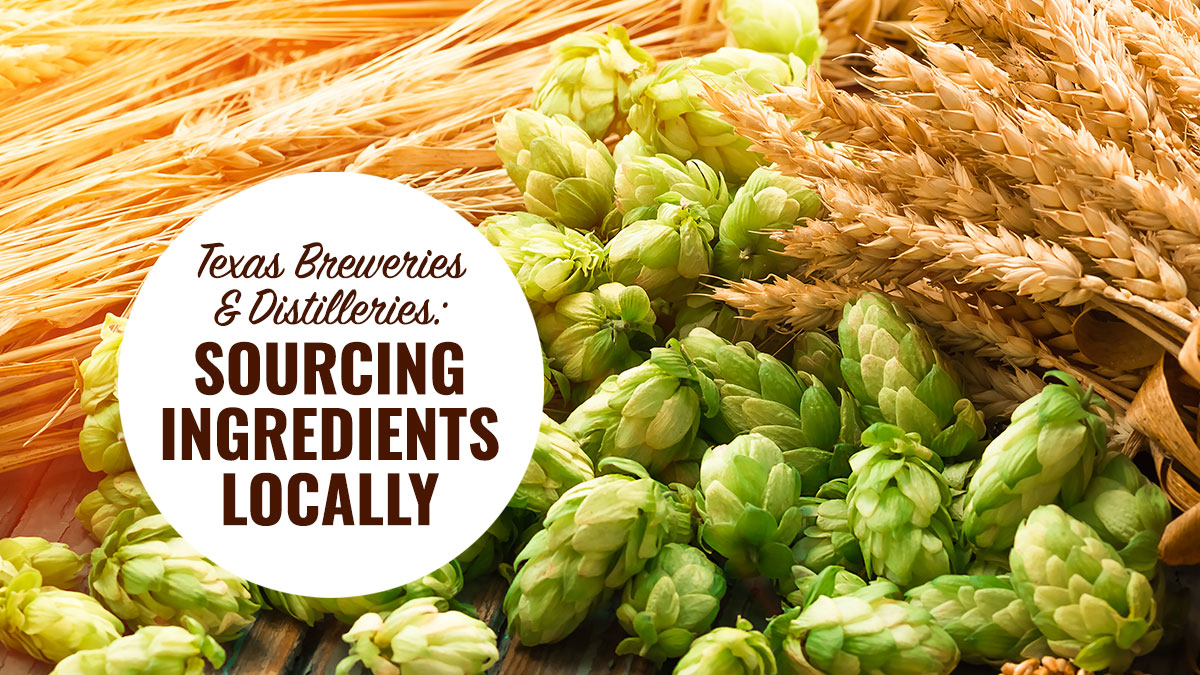
Estimated Reading Time: 8 Minutes
The craft beverage industry in Texas is flourishing, with local breweries and distilleries utilizing the state’s abundant agricultural resources. Through collaborations with local farmers and the use of traditional methods, these producers are crafting exceptional beers and spirits using homegrown ingredients. On the blog today, we’ll dive into the advantages and techniques of incorporating locally sourced ingredients into Texas-made craft beverages.
Locally Sourced Ingredients For Brewers & Distilleries
Texas’ breweries and distilleries have become emblematic of the state’s independent spirit and strong sense of community. This is evident in their commitment to using locally sourced ingredients, fostering a symbiotic relationship with local farmers and other suppliers. This practice not only supports the local economy but also infuses their products with unique flavors that are deeply rooted in the Texan terroir.
The collaboration between these producers and local farmers goes beyond mere transactions. It involves developing specific strains of crops that are perfectly tailored to the needs of the brewers and distillers. This close collaboration ensures a consistent supply of high-quality, fresh ingredients that are essential for crafting exceptional beers and spirits. Plus, it allows the producers to experiment with new and innovative flavor profiles that capture the essence of Texas’ agricultural heritage.
The use of locally sourced ingredients also has a positive impact on the environment. By reducing the distance that ingredients need to travel, it lowers the carbon footprint associated with transportation.
In essence, Texas’ breweries and distilleries are not just businesses; they are integral parts of their communities and are actively involved in promoting local agriculture, supporting sustainable practices, and celebrating the unique flavors of the Lone Star State. Through their commitment to quality, innovation, and community, they are helping to shape the future of Texas’ beverage industry.

German Heritage & Farming
The German heritage is deeply rooted in Texas, especially in areas like Fredericksburg, New Braunfels, and Brenham. German settlers brought with them their rich brewing and farming traditions that have continued through the generations and shaped the ingredient sourcing practices of breweries and distilleries, with a focus on quality, craftsmanship, and local agriculture.
These German immigrants introduced lager brewing and advanced fermentation techniques to Texas, along with heirloom barley and rye varieties perfect for brewing and distilling. These crops laid the foundation for a flourishing industry, and today, many family farms in Central Texas and the Hill Country still cultivate barley, rye, wheat, and other grains that are used by modern producers.
The German heritage is also celebrated through traditional brewing styles that remain popular in Texas, such as Märzens, Kölsches, and Bocks, which all benefit from the high-quality grains grown on local farms.
Basic Ingredients in Beer
Texas’ craft breweries have taken a strong stance on utilizing locally sourced ingredients, and this commitment to regional sourcing is exemplified by breweries such as St. Arnold’s, Real Ale Brewing Company, and Spoetzl Brewery (Shiner).
St. Arnold’s, a pioneer in the Texas craft beer scene, places a premium on using high-quality, Texas-grown malt in their brewing process. They also source their water from local wells, ensuring that the very essence of their beer is Texan. Plus, they occasionally incorporate specialty grains and honey sourced from nearby producers, adding unique, local flavors to their brews.
Real Ale Brewing Company, located in the heart of the Texas Hill Country, takes advantage of the region’s unique water source. The Hill Country’s water, with its distinct mineral composition, imparts a special character to their beers. They also collaborate closely with local maltsters to create custom malts that are tailored specifically for their seasonal beers, ensuring that each brew captures the essence of the season and the region.
Spoetzl Brewery, known for its iconic Shiner Bock, maintains a long-standing tradition of using regionally-grown malted barley. This commitment to local sourcing ensures that their flagship beer remains true to its Texas roots. They occasionally experiment with local ingredients like Texas pecans and dewberries in limited-edition brews, showcasing the diversity and richness of Texas’ agricultural bounty.
The commitment to local sourcing goes beyond simply using regional ingredients. These breweries often establish close relationships with local farmers, working together to source grains that meet their specific requirements. This collaborative approach ensures that the ingredients are not only fresh and regionally authentic but also tailored to the brewery’s unique brewing style. By supporting local agriculture and incorporating regional flavors into their beers, these Texas craft breweries are not only creating exceptional brews but also fostering a sense of community and connection to the land.
Basic Ingredients in Most Popular Texas Made Liquors
Texas has emerged as a significant player in the American whiskey landscape, with a burgeoning craft distillery scene that is redefining the spirit. Distilleries such as Garrison Brothers and Yellow Rose are leading this Texas whiskey movement, gaining national recognition for their commitment to quality and innovation.
Garrison Brothers Distillery, nestled in the heart of the Texas Hill Country in Hye, is a pioneer in the Texas whiskey scene. The distillery prides itself on using locally-sourced ingredients, including heirloom corn varieties and soft red winter wheat from the Panhandle and Hill Country regions. These grains contribute to the distinct flavor profile of Garrison Brothers’ bourbon, which is often described as sweeter and richer than traditional Kentucky bourbons.
Yellow Rose Distilling, based in Houston, holds the distinction of being the first legal whiskey distillery in the city. The distillery is dedicated to using locally-sourced, non-GMO corn and other grains in its production process. This commitment to quality ingredients and sustainable practices results in distinctive small-batch whiskeys and bourbons with unique textures and flavors. Yellow Rose Distilling’s focus on local sourcing and small-batch production highlights the craftmanship and attention to detail that are hallmarks of the Texas whiskey movement.
The rise of Texas whiskey is not only a testament to the state’s rich agricultural heritage but also a reflection of the growing demand for high-quality, craft spirits. Texas distilleries are using locally-sourced ingredients, innovative production techniques, and a deep respect for tradition to create whiskeys that are both unique and exceptional. As the Texas whiskey movement continues to gain momentum, it is clear that the Lone Star State is poised to become a major force in the world of whiskey.

Sourcing Hops
Although hop production has typically been centered in areas like the Pacific Northwest, Texas is beginning to see expansion in this industry. Due to the challenging climate in the state, large-scale production is not feasible. However, hop farms are emerging in areas like the Texas High Plains and parts of East Texas, where they are experimenting with hop varietals that can withstand heat and drought.
Some Texas brewers are working with these innovative hop growers to create small-batch beers using hops grown within the state. For example, Real Ale and St. Arnold’s have released limited edition beers using Texas-grown Cascade and Chinook hops, which have citrusy, piney, and floral notes that are unique to the local terroir.
Also, some farmers are developing hybrid hop varieties that can flourish in Texas’ unpredictable weather conditions, which will create new opportunities for the state’s craft beer industry. In addition to hops, brewers often use local ingredients like Texas-grown citrus, lavender, and wildflower honey to enhance their recipes and create brews that truly represent their region.
Benefits of Sourcing Local
Sourcing local ingredients offers a multitude of advantages to Texas breweries and distilleries.
Economic and Environmental Impact
By reducing the distance ingredients travel, these businesses can significantly cut down on transportation costs and lower their overall expenses, while also demonstrating a commitment to environmental sustainability.
Brand Identity and Product Differentiation
Utilizing local ingredients allows breweries and distilleries to craft unique beverages that capture the essence of Texas’s diverse agricultural landscape. From utilizing locally grown grains and hops to incorporating fruits, herbs, and other botanicals native to the region, these businesses can create distinctive flavors that set their products apart in a competitive market. This focus on local sourcing also provides a compelling narrative for their brand, highlighting their connection to the land and their commitment to showcasing the best of Texas’s agricultural bounty.
Consumer Trust and Product Quality
Consumers are increasingly interested in knowing where their food and beverages come from. By sourcing locally, breweries and distilleries can build trust with their customers by offering transparency and traceability. This emphasis on local ingredients also often translates to higher quality products, as locally sourced ingredients are often fresher and more flavorful than those shipped from afar. Furthermore, supporting local farmers and producers allows these businesses to foster closer relationships with their suppliers, ensuring a consistent supply of high-quality ingredients.
Texas’ essence can be tasted in every sip of locally sourced, small-batch whiskey and craft beer. With more and more producers using local ingredients, Texas is set to remain a leader in the craft beverage industry, both nationally and globally.




